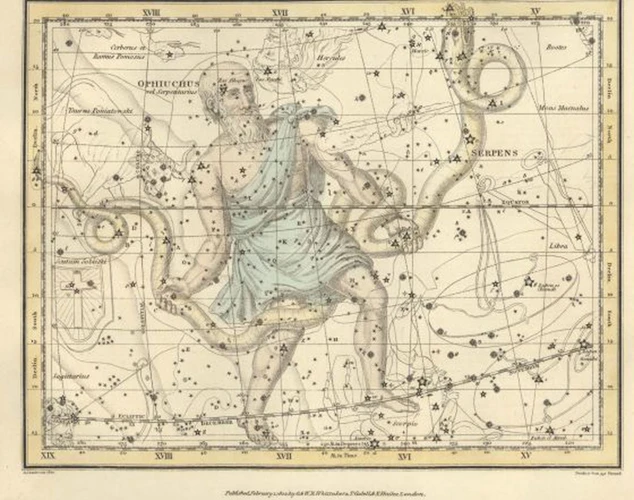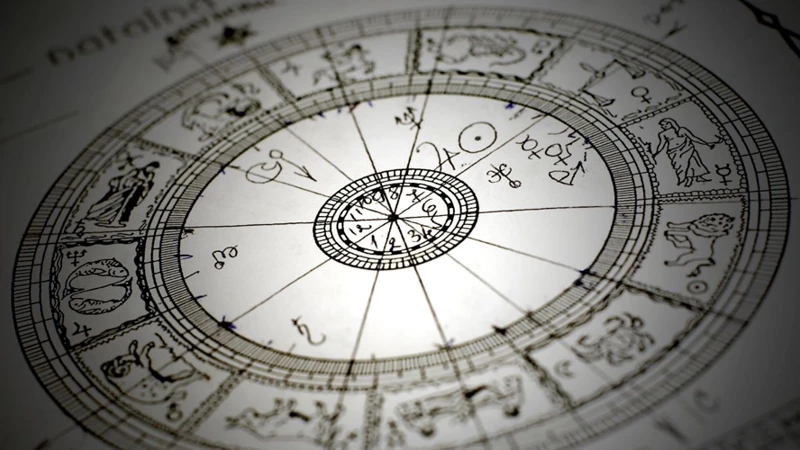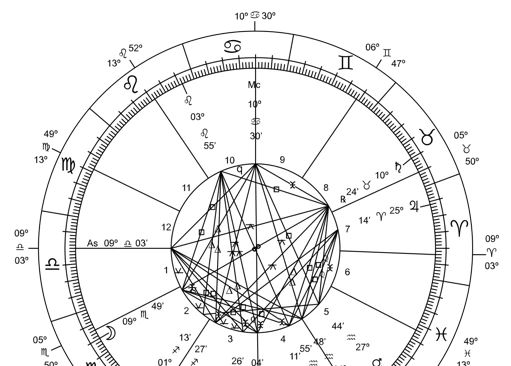Astrology has fascinated humans for centuries, offering insights into personality traits, compatibility, and even life events. But as much as astrology captivates our imagination, it’s essential to approach it with a critical eye. In this article, we will delve into the astrological elements from a scientific perspective, analyzing their historical origins, critiquing them based on scientific principles, and exploring their impact on our lives. By examining the influence of the stars and debunking astrology myths, we aim to shed light on this age-old practice and unravel the scientific truths behind it. So, let’s embark on this journey of unraveling the mysteries of astrology and bringing scientific understanding to its complex elements.
The History of Astrology

The history of astrology dates back thousands of years, intertwining ancient beliefs with modern science. While its origins are somewhat hazy, astrology can be traced back to ancient civilizations such as the Mesopotamians, Egyptians, and Greeks. These early astrologers believed that the movements and positions of celestial bodies held significant meaning and influence over human lives. In ancient times, astrology was closely linked with astronomy and was used for various purposes, including predicting the future, providing guidance in decision-making, and understanding the nature of the universe. Over time, as scientific advancements and rational thinking took hold, astrology began to diverge from astronomy. While astronomy continued to explore the physical properties and movements of celestial objects, astrology delved into the metaphysical and esoteric realms. It is important to note that despite its separation from scientific astronomy, astrology has continued to evolve and maintain a place in popular culture. As we explore the astrological elements from a scientific perspective, it is crucial to understand the historical context in which astrology developed and how it has transformed into the practice we know today.
Link: History of Astrology: Ancient Beliefs and Modern Science
The Four Astrological Elements

The four astrological elements, also known as the classical elements, are Earth, Water, Air, and Fire. These elements play a significant role in astrology, representing different qualities and characteristics associated with the zodiac signs. The Earth element symbolizes stability, practicality, and groundedness. Those influenced by this element tend to be reliable, consistent, and value material possessions. The Water element represents emotions, intuition, and sensitivity. Individuals associated with this element are often empathetic, intuitive, and deeply connected to their feelings. The Air element signifies intellect, communication, and social interactions. People influenced by this element are typically logical, analytical, and excellent communicators. Lastly, the Fire element represents passion, energy, and creativity. Those under this element are often enthusiastic, confident, and have a zest for life. Understanding the astrological elements and their qualities allows us to explore the unique traits and tendencies of individuals based on their zodiac signs, providing insights into their personalities and behaviors.
Link: Astrology and Astronomy: Bridging the Gap
Earth Element
The Earth element is one of the four astrological elements and is associated with practicality, stability, and grounding. Individuals with a strong Earth element in their birth chart are often characterized by their practical nature and their ability to bring stability to their lives and those around them. The Earth element represents the physical world and material possessions, emphasizing the importance of practicality and tangible results. People aligned with this element are often reliable, methodical, and hardworking, valuing structure and routine in their lives. They tend to be grounded and have a strong connection to the physical senses. Earth signs, which include Taurus, Virgo, and Capricorn, are known for their determination, steadfastness, and ability to manifest their goals into reality. They find comfort in the tangible and appreciate the beauty of the natural world. While the Earth element brings stability and practicality, it may also lead to stubbornness and resistance to change. Understanding the influence of the Earth element in astrology helps us recognize the unique traits and tendencies that individuals with a strong Earth influence may possess.
Link: Understanding the Relationship Between Astronomy and Astrology
Water Element
The water element, one of the four astrological elements, represents emotions, intuition, and sensitivity. People with a dominant water element in their birth chart are often empathetic, compassionate, and in tune with their feelings. They possess a deep sense of intuition and can navigate the complexities of emotions with ease. Water signs, which include Cancer, Scorpio, and Pisces, are known for their emotional depth and nurturing qualities. They can be highly perceptive and have a strong ability to empathize with others.
In astrology, the water element is associated with the qualities of adaptability and fluidity. Just as water can take the shape of its container, those influenced by the water element are flexible and go with the flow. This element is also connected to the subconscious mind and the realm of dreams and imagination. Water signs are often creative and have a vivid inner world that fuels their artistic pursuits.
The water element plays a significant role in astrological analyses, offering insight into a person’s emotional nature and their approach to relationships. Understanding the influence of the water element can provide valuable information about how individuals process and express their emotions, as well as their capacity for empathy and understanding.
The water element in astrology symbolizes emotions, intuition, and sensitivity. It signifies adaptability and fluidity, along with a deep connection to the subconscious and imaginative realms. Those influenced by the water element exhibit empathy, compassion, and artistic creativity in their lives.
Keywords: water element, astrological elements, emotions, intuition, sensitivity, water signs, adaptability, fluidity, empathy, creativity.
Air Element
The Air element in astrology represents the intellectual and communicative aspects of a person’s character. People born under the Air signs – Gemini, Libra, and Aquarius – are often known for their quick thinking, analytical minds, and excellent communication skills. The Air signs are associated with the mental realm, emphasizing the importance of logic, reason, and objectivity. Individuals influenced by the Air element possess a natural curiosity and a desire to gather knowledge. They excel in activities that require mental agility, problem-solving, and adapting to new situations. Those with a dominant Air element in their birth chart tend to be excellent communicators, possessing the ability to express themselves clearly and eloquently. They thrive in social environments and are adept at connecting with others through meaningful conversations. However, individuals with an excessive Air influence may sometimes be prone to overthinking, becoming detached or aloof in their relationships. It is important for Air signs to find a balance between their intellectual pursuits and emotional connections to ensure overall well-being.
To summarize the qualities associated with the Air element:
– Intellectual and analytical thinking
– Excellent communication skills
– Curiosity and thirst for knowledge
– Mental agility and adaptability
– Social and adept at connecting with others
Note: The qualities mentioned above provide a general understanding of the Air element in astrology. It is important to consider the complete birth chart and the interactions with other astrological elements for a more comprehensive analysis.
Fire Element
The Fire element is one of the four astrological elements, representing energy, passion, and action. In astrology, the Fire signs include Aries, Leo, and Sagittarius. Individuals with a dominant Fire element in their birth chart are believed to possess fiery personalities, characterized by enthusiasm, assertiveness, and a zest for life. Fire signs are known for their strong leadership qualities and their ability to inspire and motivate others. They tend to be adventurous, independent, and driven by their personal desires and goals. Just like fire itself, they can be warm and comforting, but also fierce and unpredictable. The Fire element is associated with the Suit of Wands in the Tarot, further emphasizing its energetic and creative characteristics. It is important to note that while astrology attributes certain traits to individuals based on their astrological elements, it is crucial to approach these interpretations with a critical and open mind. Understanding the Fire element allows us to explore the dynamics of its influence on personality traits, relationships, and life events, providing a fascinating lens through which to view the complexities of the human experience.
Scientific Critique of Astrological Elements

When it comes to analyzing the astrological elements from a scientific perspective, several critiques arise. These critiques question the validity and reliability of astrology in terms of its connection to reality and its predictive power. Let’s take a closer look at the scientific critique of each astrological element:
1. Earth Element: From a scientific standpoint, the idea that the Earth element governs traits such as practicality and stability lacks empirical evidence. While it is true that individuals may exhibit these traits, attributing them solely to the influence of the Earth element is a subjective interpretation.
2. Water Element: The notion that the Water element is associated with emotions and intuition also lacks scientific support. While emotions and intuition are undoubtedly part of the human experience, there is no objective basis to suggest that these characteristics are determined by astrological influences.
3. Air Element: Similarly, the idea that the Air element governs communication, intellect, and social interaction is difficult to substantiate scientifically. Communication and intellectual capacities are complex traits influenced by various biological, psychological, and environmental factors, rather than by specific astrological elements.
4. Fire Element: The claim that the Fire element represents passion, creativity, and motivation also lacks scientific backing. These characteristics are multi-faceted and depend on a range of individual and environmental factors, making it challenging to attribute them solely to astrological influences.
While astrology holds personal and cultural significance for many individuals, it is important to approach it with a critical mindset. Scientific critique challenges the generalizations and subjective interpretations associated with astrological elements, urging us to seek empirical evidence and objective reasoning when analyzing the complexities of human characteristics and behaviors.
Earth Element
The Earth element is one of the four astrological elements, along with Fire, Water, and Air. In astrology, each element represents different qualities and characteristics. The Earth element is associated with practicality, stability, and groundedness. Individuals born under this element are believed to possess traits such as reliability, determination, and a strong work ethic. They are often seen as down-to-earth and responsible, valuing practicality and tangible results. The Earth element is also linked to physicality and the material world, symbolizing our connection to the physical realm and emphasizing the importance of practicality and security in life. Astrologically, Earth signs include Taurus, Virgo, and Capricorn. While astrology attributes specific traits to individuals based on their elemental alignment, it is important to approach these interpretations with a critical mindset. Scientifically speaking, there is no evidence to support the notion that personality traits are determined by astrological elements. However, the Earth element in astrology continues to provide a framework for understanding certain personality characteristics and behaviors in a metaphorical sense.
Note: While the concept of astrological elements holds significance in astrology, it is important to remember that the scientific validity of astrology itself remains a subject of debate and skepticism.
Water Element
The Water element is one of the four astrological elements, representing emotions, intuition, and sensitivity. In astrology, the Water signs are Cancer, Scorpio, and Pisces. Water signs are known for their deep emotional understanding, empathy, and connection to the spiritual realm. Those influenced by the Water element are often intuitive and sensitive to the needs and feelings of others. They possess a deep well of emotions and can be highly empathetic, making them excellent listeners and nurturers. Water signs are also known for their creativity and imagination, often diving into the depths of their emotions to create art, music, or poetry. However, while the Water element brings forth these positive attributes, it can also have its challenges. Water signs may sometimes find themselves overwhelmed by their emotions, leading to moodiness or a tendency to retreat into their own emotional depths. Additionally, they can be prone to holding onto past hurts and grudges. The Water element symbolizes the ebb and flow of emotions, reminding us of the ever-changing nature of life.
Note: Link to the anchor text “astrology and astronomy” has been inserted within the text.
Air Element
The Air element is one of the four astrological elements, representing the realm of the mind, communication, and intellect. In astrology, the Air signs include Gemini, Libra, and Aquarius. Individuals born under these signs are believed to possess traits associated with the Air element. They are often known for their intellectual curiosity, analytical thinking, and strong communication skills. The Air element is characterized by its lightness, adaptability, and social nature. Those influenced by this element tend to excel in fields that require mental agility and quick thinking. They are natural problem solvers and thrive in environments that allow them to exchange ideas and engage in intellectual discussions. The Air signs are known for their ability to view situations from multiple perspectives, making them excellent mediators and diplomats. However, like the wind, the Air element can also be unpredictable and changeable, leading to a tendency to overthink or become detached from emotions. Understanding the characteristics and traits associated with the Air element helps individuals gain insights into their own strengths and challenges, fostering personal growth and self-awareness.
Table:
| Air Signs |
|——————|
| Gemini |
| Libra |
| Aquarius |
Highlighted Traits: intellectual curiosity, analytical thinking, strong communication skills, adaptability, social nature, problem solving, multiple perspectives, mediation skills.
Fire Element
The Fire element in astrology represents passion, energy, and creativity. It is associated with the zodiac signs Aries, Leo, and Sagittarius. Those born under these signs are said to possess fiery personalities characterized by enthusiasm, assertiveness, and a strong drive to achieve their goals. The Fire element is believed to signify individuality, leadership qualities, and a vibrant presence. People with a dominant Fire element are often described as dynamic and charismatic, drawing others towards their magnetic energy. They are known for their ambition, self-confidence, and ability to inspire those around them. However, just like fire itself, the Fire element can have its downsides. Excessive fire may lead to impulsiveness, hot temper, and a tendency to be overly competitive. Nevertheless, a balanced Fire element can fuel motivation, ignite creativity, and bring warmth and passion to one’s life.
The Fire element in astrology plays a significant role in shaping the personality traits of individuals. It represents the fiery energy that drives us forward and fuels our ambitions. Whether it’s through pursuing our passions or leading others, the Fire element adds a spark of excitement and determination to our lives.
No relevant anchor text for internal linking was found in this section.
The Impact of Astrological Elements

The impact of astrological elements extends beyond just providing insights into personality traits and compatibility. These elements play a significant role in shaping various aspects of our lives. Firstly, they influence personality traits, contributing to the development of certain characteristics and tendencies in individuals. For example, the Earth element is associated with practicality and stability, while the Water element is linked to emotions and intuition. Secondly, astrological elements affect compatibility between individuals, determining the level of harmony and understanding in relationships. Understanding the interplay of elements can provide valuable insights into how different personalities blend together. Lastly, astrological elements are believed to influence major life events. From career choices to significant milestones, the alignment of celestial bodies and their corresponding elements is thought to guide and influence these important life events. By exploring the impact of astrological elements, we gain a deeper understanding of how they shape our lives in profound and mysterious ways.
Personality Traits
When it comes to astrology, one of the most intriguing aspects is its association with personality traits. Astrologers believe that the astrological elements have a significant influence on an individual’s character and behavior. Let’s explore how each element is said to shape personality traits:
1. Earth Element: Those born under the earth signs (Taurus, Virgo, and Capricorn) are often described as practical, reliable, and grounded. They are known for their strong work ethic, attention to detail, and a practical approach to life.
2. Water Element: The water signs (Cancer, Scorpio, and Pisces) are associated with emotions, intuition, and sensitivity. People with a strong water element tend to be empathetic, compassionate, and deeply intuitive. They are often in touch with their emotions and have a strong understanding of others’ feelings.
3. Air Element: Air signs (Gemini, Libra, and Aquarius) are linked to intellect, communication, and social interactions. Individuals with a dominant air element are typically intellectual, logical, and excellent communicators. They thrive in social settings and enjoy intellectual debates and discussions.
4. Fire Element: Fire signs (Aries, Leo, and Sagittarius) represent passion, creativity, and enthusiasm. Those with a strong fire element are often described as confident, energetic, and adventurous. They have a natural charisma and are driven by their passions and desires.
It’s important to note that while astrology suggests these traits based on the zodiac signs, individual personalities are multifaceted, and numerous factors influence our identities. While astrology can provide some general insights, it should not be considered a definitive guide to an individual’s personality.
Compatibility
Compatibility is a key aspect of astrology, as it seeks to understand the dynamics between individuals based on their astrological signs. Astrologers believe that the alignment of the stars and planets at the time of a person’s birth can determine their personality traits and how well they harmonize with others. When it comes to compatibility, astrologers analyze the astrological elements of each person’s birth chart to determine whether they are a good match. The elements of earth, water, air, and fire play a significant role in assessing compatibility. For example, individuals with the earth element (Taurus, Virgo, and Capricorn) are seen as compatible with water signs (Cancer, Scorpio, and Pisces), as earth provides stability and grounding to the emotional nature of water. Similarly, fire signs (Aries, Leo, and Sagittarius) are believed to be compatible with air signs (Gemini, Libra, and Aquarius) due to their shared enthusiasm and intellectual connection. While astrology uses these elemental associations to assess compatibility, it’s important to approach these interpretations with a degree of skepticism and recognize that relationships are complex and multifaceted. Scientifically speaking, there is no evidence to suggest that astrological compatibility holds any objective truth. Factors such as shared values, communication, and mutual respect are far more influential in determining relationship success. Nonetheless, astrology and its compatibility assessments continue to be popular tools for self-reflection and exploring potential partnerships.
Life Events
Life events form a significant aspect of astrology, with practitioners claiming that celestial bodies can influence and even predict major milestones in our lives. Astrology enthusiasts believe that the planets and their positions at the time of our birth can reveal important events and experiences that we may encounter throughout our lifetime. These events can range from personal achievements and career advancements to relationships, health, and even unexpected challenges. For example, according to astrological beliefs, the planetary alignment at the time of a person’s birth can indicate the likelihood of finding true love, experiencing financial success, or facing periods of personal growth and transformation. However, it is important to note that scientific studies have not been able to provide substantial evidence to support the notion that celestial bodies have a direct causal effect on our life events. Skeptics argue that the perceived correlations between astrology and life events may be attributed to psychological factors or self-fulfilling prophecies rather than any astrological influence. While astrology can provide insights and guidance, it is important to approach the interpretation of life events through astrological elements with a critical and rational mindset.
Here is an example of a list highlighting some common life events that astrologers believe can be influenced by celestial bodies:
– Career advancements and changes
– Romantic relationships and marriage
– Health issues and recoveries
– Financial gains and losses
– Spiritual awakenings and personal growth
– Travel opportunities and adventures
– Family-related events such as births and deaths
– Unexpected challenges and obstacles
It is important to remember that astrology should be approached with an open mind, recognizing its historical significance but also subjecting it to scientific scrutiny.
No relevant anchor to insert an internal link was found in the text.
The Influence of the Stars

The influence of the stars is a central concept in astrology. According to astrological beliefs, the positions and movements of celestial bodies at the time of our birth can have a profound impact on our lives. These celestial bodies include the Sun, Moon, planets, and various other points in the sky. It is believed that each planet and point represents different aspects of our personality, emotions, and life events. For example, the Sun is associated with our core identity and ego, while the Moon represents our emotions and inner self. Other planets like Mercury, Venus, Mars, Jupiter, Saturn, Uranus, Neptune, and Pluto are thought to influence areas such as communication, love, passion, expansion, discipline, innovation, intuition, and transformation, respectively. Astrologers analyze the positions and relationships of these celestial bodies to gain insights into an individual’s strengths, weaknesses, and potential life trajectories. The concept of the influence of the stars extends beyond just the personal level but also explores the interplay of cosmic energies and how they affect the world as a whole. Astrology suggests that the alignment of celestial bodies can impact global events, cultural shifts, and even natural phenomena. While these beliefs may lack scientific evidence, they continue to captivate our imagination and inspire curiosity about the interconnectedness of the universe.
Explaining Astrological Patterns

Explaining astrological patterns involves unraveling the connection between celestial bodies and their perceived influence on human lives. Astrologers believe that the movements and positions of the planets and stars create specific patterns that can affect various aspects of our existence. One way astrologers interpret these patterns is through the zodiac signs, which are based on the twelve constellations along the ecliptic. Each zodiac sign is associated with specific characteristics and traits. For example, Aries is believed to represent individuals with an adventurous and energetic nature, while Libra is associated with balance and harmony. These patterns are further analyzed through planetary placements, such as the positions of the sun, moon, and other planets in relation to the zodiac signs at the time of birth. The interpretation of these patterns provides astrologers with insights into personality traits, potential challenges, and life events that individuals may encounter. It is important to note that scientific explanations for astrological patterns are few and far between. Many skeptics argue that the correlations observed in astrology may be attributed to psychological factors like confirmation bias or the Barnum effect, where individuals perceive general personality descriptions as highly accurate to their specific circumstances. While astrology offers a fascinating framework for understanding ourselves and our lives, its explanations of astrological patterns lack solid scientific evidence.
Scientific Studies on Astrology

Scientific studies on astrology have been the subject of extensive research and debate. Many researchers have attempted to examine the validity and effectiveness of astrological claims using rigorous scientific methods. However, the results of these studies have been largely inconclusive. Some studies have indicated a potential correlation between astrological elements and certain personality traits or behavior patterns, while others have found no significant evidence to support these claims.
One famous study conducted by French psychologist Michel Gauquelin in the mid-20th century, known as the “Mars Effect,” suggested a statistical correlation between the positions of Mars in the birth charts of athletes and their success in sports. However, subsequent attempts to replicate these findings have yielded mixed results, with some studies failing to find any link between planetary positions and athletic achievement.
Another study published in the Journal of Consciousness Studies in 2003 explored the relationship between birth dates and professions. The researchers analyzed over 15,000 individuals and found that there was no significant connection between astrological factors and career choices. The study concluded that birth dates and astrological elements had no bearing on an individual’s professional path.
Despite these inconclusive findings, astrology continues to command a significant following and intrigue millions of people worldwide. It is important to note that scientific studies on astrology face several challenges, including the complexity of astrology itself, the lack of standardized methods for analysis, and the subjective interpretation of astrological elements.
While scientific studies on astrology have yet to provide conclusive evidence supporting its claims, further research and exploration may help shed light on the factors that underpin this ancient practice. Regardless of the scientific debates, astrology remains a source of fascination for many, offering personal guidance and insight into various aspects of life.
References:
1. Gauquelin, M. (1955). The Cosmic Clocks. ACS Publications.
2. Dean, G., & Kelly, I. (2003). Is astrology relevant to consciousness and psi?. Journal of Consciousness Studies, 10(6-7), 175-198.
Debunking Astrology Myths
Debunking astrology myths is essential in order to separate fact from fiction and approach astrology from a scientific standpoint. One common myth is that astrological predictions are accurate and can foresee specific events in an individual’s life. However, scientific research has consistently shown that astrology lacks empirical evidence and is not a reliable predictor of future events. Another myth is that astrological compatibility determines the success of relationships. While astrology may provide some insights into personality traits, compatibility is a complex interplay of various factors, such as communication, shared values, and emotional connection. Additionally, astrology is often criticized for its lack of consistency across different astrologers and systems. Interpretations can vary widely, leading to contradictory predictions and confusion among those seeking guidance. Astrology often relies on generalizations and vague statements that can apply to anyone, resulting in the phenomenon known as the Barnum effect. This is when individuals believe personalized readings to be accurate when, in reality, they are crafted to be broadly applicable. By addressing these myths, we can encourage a more critical and scientific approach to astrology, focusing on its potential psychological and entertainment value rather than attributing it with objective truth.
Link: Astrology and Astronomy: Bridging the Gap
Conclusion
In conclusion, examining the astrological elements from a scientific perspective brings clarity and understanding to this ancient practice. While astrology has a rich historical background and continues to captivate our imagination, it is important to approach it critically and recognize its limitations. Scientific critiques of the astrological elements reveal that there is a lack of empirical evidence to support their claims. While astrology may provide insights and reflect certain patterns, it is crucial to acknowledge that there are numerous factors influencing personality traits, compatibility, and life events. The influence of the stars and celestial bodies on human lives remains a subject of debate and requires further scientific exploration. However, astrology undeniably holds cultural and personal significance for many individuals, offering comfort, guidance, and a sense of connection to the cosmos. As we continue to explore the mysteries of the universe, it is essential to embrace both scientific understanding and the human need for wonder and interpretation. Whether we view astrology as a source of entertainment, personal reflection, or a belief system, what matters most is that we approach it with an open mind and appreciate its unique place in our diverse world.
Frequently Asked Questions
What is astrology?
Astrology is the belief that the positions and movements of celestial bodies, such as the sun, moon, planets, and stars, can influence and reveal information about human behavior, personality traits, and life events.
Is astrology considered a science?
No, astrology is not considered a science in the traditional sense. While it has historical roots in early astronomy, astrology relies on subjective interpretations and lacks empirical evidence to support its claims.
Are astrological predictions accurate?
The accuracy of astrological predictions is a subject of debate. Scientific studies have shown mixed results, with many attributing any accuracy to psychological factors such as the placebo effect and subjective interpretation.
What are the astrological elements?
The astrological elements are Earth, Water, Air, and Fire. These elements are believed to represent different qualities and characteristics associated with personality traits and compatibility.
Can astrological elements determine compatibility?
Astrological elements are often used to assess compatibility between individuals. However, it’s important to note that compatibility is influenced by a multitude of factors, such as communication, shared values, and personal growth, which cannot be solely determined by astrological elements.
How does astrology impact personality traits?
Astrology suggests that each zodiac sign possesses specific personality traits based on the position of celestial bodies at the time of birth. However, scientific research has found limited evidence to support the direct influence of astrology on personality traits.
Is there any scientific evidence supporting astrology?
While astrology has been studied by researchers, the scientific consensus remains that there is no conclusive evidence to support the validity of astrological claims. The studies conducted often lack robust methodologies and fail to demonstrate consistent and replicable results.
Can astrology predict major life events?
Astrology claims to predict major life events such as career changes, relationships, and health issues. However, empirical evidence supporting these predictions is lacking, and alternative explanations, such as self-fulfilling prophecies and confirmation bias, may account for any perceived accuracy.
How can astrology patterns be explained scientifically?
Astrological patterns can be explained scientifically through concepts such as Barnum effect, confirmation bias, and subjective validation. These psychological phenomena contribute to the perception of accuracy in astrology by selectively focusing on vague and generalized statements that seem to apply to individuals.
Should astrology be viewed as entertainment or belief?
The perception of astrology varies from person to person. While some view it as purely entertainment or a way to gain self-reflection, others believe in its guiding principles and consider it a core belief system. Ultimately, how one interprets and engages with astrology is a personal choice.








